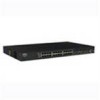Dell PowerConnect 5324 User's Guide - Page 252
Interface, Designated, Alternate, Backup, Disabled, Fast Link Operational Status
 |
View all Dell PowerConnect 5324 manuals
Add to My Manuals
Save this manual to your list of manuals |
Page 252 highlights
www.dell.com | support.dell.com Figure 7-101. Rapid Spanning Tree (RSTP) Interface - Port or LAG on which Rapid STP is enabled. Role - The port role assigned by the STP algorithm in order to provide to STP paths. The possible field values are: Root - Provides the lowest cost path to forward packets to root device. Designated - The port or LAG via which the designated device is attached to the LAN. Alternate - Provides an alternate path to the root device from the root interface. Backup - Provides a backup path to the designated port path toward the Spanning Tree leaves. Backup ports occur only when two ports are connected in a loop. Backup ports also occur when a LAN has two or more connections connected to a shared segment. Disabled - The port is not participating in the Spanning Tree (the port's link is down). Fast Link Operational Status - Indicates if Fast Link is enabled or disabled for the port or LAG. If Fast Link is enabled for a port, the port is automatically placed in the forwarding state. Point-to-Point Admin Status - Enables or disables the device to establish a point-to-point link, or specifies for the device to automatically establish a point-to-point link. To establish communications over a point-to-point link, the originating PPP first sends Link Control Protocol (LCP) packets to configure and test the data link. After a link is established and optional facilities are negotiated as needed by the LCP, the originating PPP sends Network Control Protocols (NCP) packets to select and configure one or more network layer protocols. When each of the chosen network layer protocols has been configured, packets from each network layer 252 Configuring Device Information















